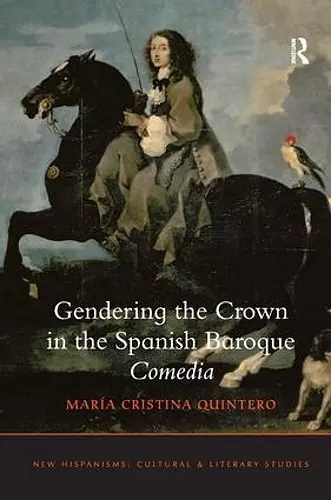Gendering the Crown in the Spanish Baroque Comedia
Maria Cristina Quintero author
Format:Hardback
Publisher:Taylor & Francis Ltd
Published:28th Jun '12
Currently unavailable, and unfortunately no date known when it will be back
This hardback is available in another edition too:
- Paperback£46.99(9781138109995)

The Baroque Spanish stage is populated with virile queens and feminized kings. This study examines the diverse ways in which seventeenth-century comedias engage with the discourse of power and rulership and how it relates to gender. A privileged place for ideological negotiation, the comedia provided negative and positive reflections of kingship at a time when there was a perceived crisis of monarchical authority in the Habsburg court. Author MarÃa Cristina Quintero explores how playwrights such as Pedro Calderón de la Barca, Tirso de Molina, Antonio Coello, and Francisco Bances Candamo--taking inspiration from legend, myth, and history--repeatedly staged fantasies of feminine rule, at a time when there was a concerted effort to contain women's visibility and agency in the public sphere. The comedia's preoccupation with kingship together with its obsession with the representation of women (and women's bodies) renders the question of royal subjectivity inseparable from issues surrounding masculinity and femininity. Taking into account theories of performance and performativity within a historical context, this study investigates how the themes, imagery, and language in plays by Calderón and his contemporaries reveal a richly paradoxical presentation of gendered monarchical power.
'Here is a provocative analysis seasoned with lots of historical and contextual information, a valuable addition to the literature on golden age comedia. Summing Up: Highly recommended. Upper-division undergraduates and above.' Choice 'Quintero's gives us an astute study of staged representations of women in power in a dozen key Baroque comedias, brilliantly juxtaposing the flow of desire transmitted by performance to the theatrical law that encloses them in subordinate positions. Her fine-grained and theoretically informed analysis contextualizes them historically within a seventeenth-century climate of crisis for masculinity and anxiety over monarchical succession.' Margaret R. Greer, Duke University '... the book raises fascinating questions about queenly rule and its representation on stage in Baroque Spain, making a valuable contribution to our understanding of the many currents that influence theatrical performance of the period.' Bulletin of the Comediantes ’...female figures, while ostensibly bound to theatrical convention and patriarchal bias, leave a lasting contribution in their own right, at the very least a more fluid and ambiguous vision of gender and power, and perhaps even more than that, a means of interrogating the very structures by which women are contained. In doing so [Quintero] gives us further expert evidence of the Comedia’s sophisticated, self-conscious, and potentially critical relationship with the political system, and new insight into the compelling nature of a feminine power that is negated yet never wholly eradicated.’ Bulletin of Spanish Studies 'MarÃa Cristina Quintero makes a most welcome contribution to scholarship on the representation of monarchy in early modern Spanish theater. While several books have focused on kings, Quintero concentrates on queens-strikingly present in the comedia, if often overlooked by critics. Gender, Quintero forcefully argues, was at the crux of explorations of monarchical power on the s
ISBN: 9781409439639
Dimensions: unknown
Weight: 589g
264 pages